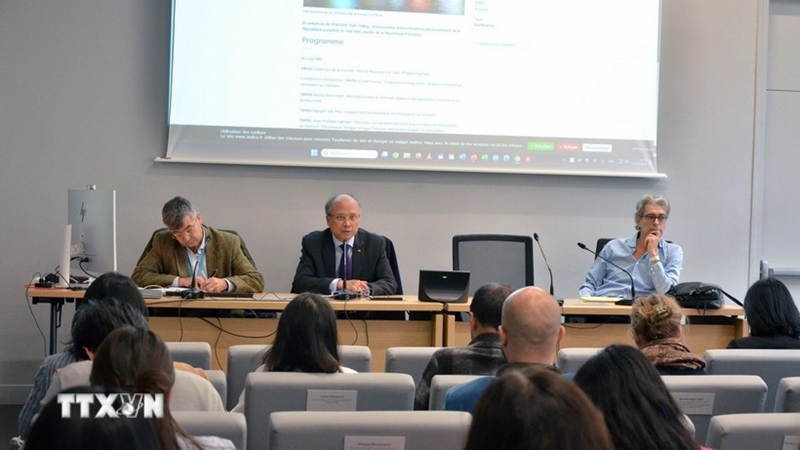The event formed part of the France - Vietnam Year of Innovation, an initiative launched by the French Embassy in Vietnam in collaboration with research institutions and the Vietnam Innovation Network in Europe (VINEU). The high-level academic forum aimed to explore directions for building an innovation system tailored to Vietnam’s development needs in the coming decades.
    |
 |
|
Vietnamese Ambassador to France Dinh Toan Thang (center) speaks at the workshop. |
In his opening remarks, Professor Michel Blanchard, the program coordinator, said Vietnam faces the challenge of escaping the “middle-income trap” as it strives to become a high-income economy by 2045. To achieve this goal, he said, innovation must serve as the central driver of growth.
Jean-Philippe Eglinger, initiator of the France - Vietnam Year of Innovation, said the symposium sought to provide an overview of Vietnam’s innovation ecosystem, particularly since the government launched the national startup support initiative, Program 844, in 2016. The event, he noted, offered an opportunity for experts, entrepreneurs, and students from both countries to exchange experiences and discuss innovation models suited to Vietnam’s context, contributing to its goal of becoming an upper-middle-income country by 2030 and a developed nation by 2045.
Vietnamese Ambassador to France Dinh Toan Thang praised the initiative as a strategically significant event, given Vietnam’s efforts to transform its growth model. “Science, technology, innovation, and digital transformation are key breakthroughs, and main engines for renewing Vietnam’s development model toward sustainability,” he said.
The ambassador underscored France’s role as a technological power and a comprehensive strategic partner of Vietnam, highlighting broad cooperation potential in artificial intelligence, cybersecurity, civil nuclear energy, high-speed rail, clean energy, aerospace, high-tech agriculture, and advanced medicine. He also stressed France’s important contribution to training high-quality human resources for Vietnam through scholarships, dual-degree programs, and joint research projects.
In his presentation, Professor Blanchard analyzed Vietnam’s macroeconomic landscape, noting its reliance on manufacturing and assembly in electronics with limited domestic value added. He said that while this model spurred early export-led growth, Vietnam needs to shift toward more knowledge- and technology-intensive industries, investing in productivity and innovation to overcome the middle-income trap.
Blanchard highlighted Vietnam’s strong political will, emphasizing that innovation is viewed not only as a science and technology task but as a nationwide endeavor. He suggested that Vietnam could learn from France’s experience in fostering public-private collaboration among universities, research institutes, and businesses to build a comprehensive innovation ecosystem.
The workshop concluded with lively exchanges between scholars and the French - Vietnamese business community on technological trends, digital transformation, and bilateral cooperation in innovation. Participants agreed that innovation is not only an inevitable trend but also a defining imperative of the era, the foundation for green growth, sustainable development, and Vietnam’s stronger position in global value chains.
Source: VNA